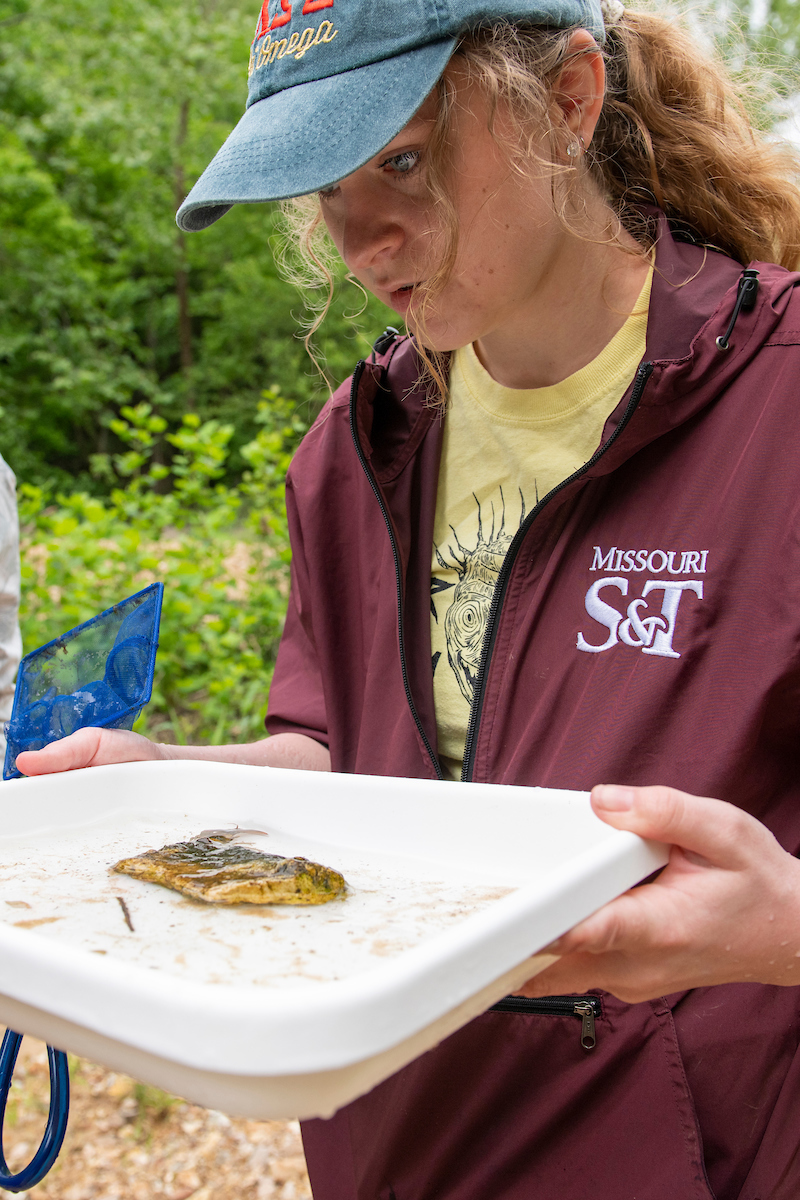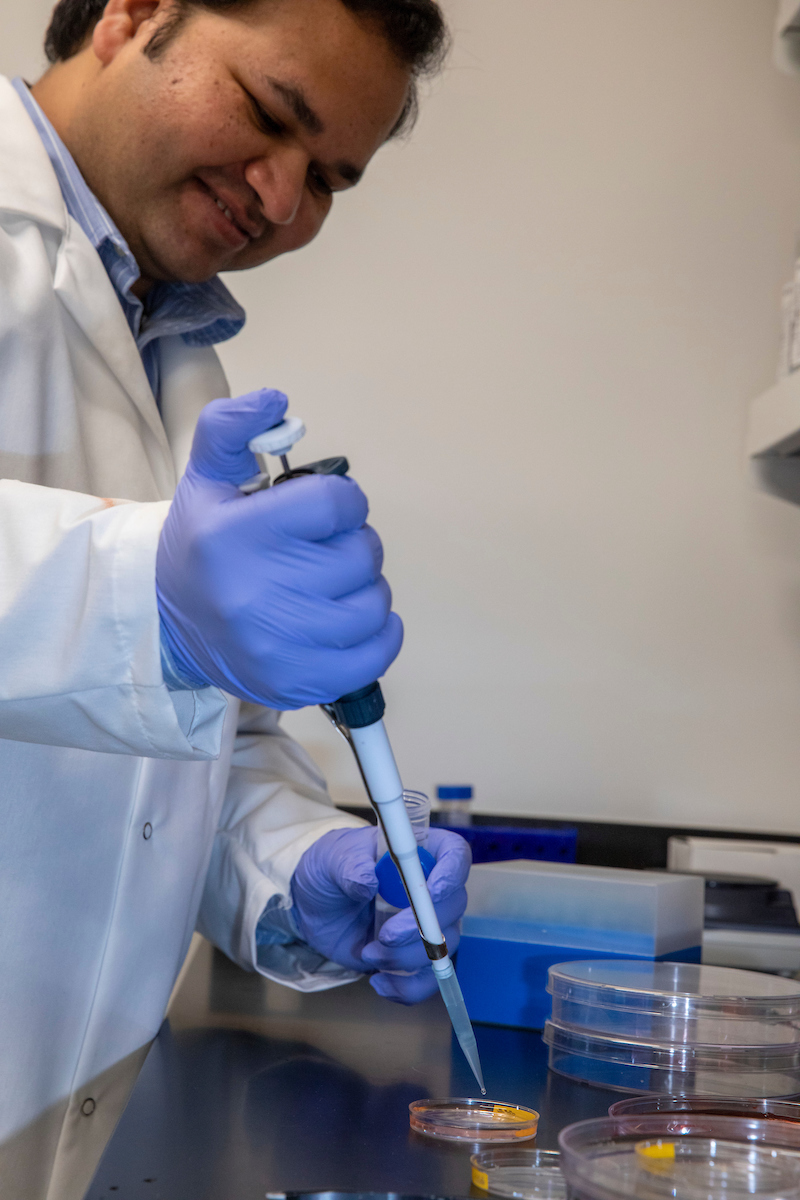General Information
The Biological Sciences Department offers a non-thesis Master of Science (MS) degree in biological sciences. An MS degree allows you to enhance your experience and career marketability for jobs in state and federal agencies, foundations, research and diagnostic jobs in health care, and industry jobs in areas including pharmaceuticals and agricultural biotechnology. This degree can also serve as a steppingstone to a Ph.D. An MS degree in Biological Sciences also meets the minimum requirement for teachers who wish to instruct classes that award college-level credit.
Our MS in Biological Sciences degree program provides a high level of flexibility, with the option to apply graduate certificates in related STEM fields to your MS degree, allowing you to add additional value to your program of graduate study. If you are an undergraduate in our S&T Bachelor of Science program you may take advantage of the Grad Track Pathway, allowing you to begin enrolling in graduate courses during the senior year of your undergraduate studies.
If you are a preservice or in service high school teacher who specializes in biology and life sciences high school curriculum, you may be interested in the non-thesis Master of Science in Biology with emphasis in STEM education. This emphasis area combines an MS in biology with a graduate certificate in Teacher Leadership.
Program Requirements
The MS program in Biological Sciences without a Thesis requires a minimum of 30 coursework hours. Up to six credit hours may be taken at the 3000-level in courses offered by other departments. A minimum of 24 credit hours of 4000-, 5000-, and 6000-level lecture courses must be included. A minimum of nine of those credit hours must come from 6000-level lecture courses. No credit hours of graduate research (Bio Sci 5099) may be applied towards the student’s plan of study.
Admission Requirements
Students interested in the MS in Biological Sciences should review the admissions requirements listed on our website and Graduate Student Handbook.
- BS or BA degree in the Biological Sciences or a related field
- GPA 3.0 or greater for standard admission, 3.5 or greater for priority admission
- GRE V+Q > 300, WR >3.0
- Transcripts
- English proficiency test score requirements (TOEFL (>80), IELTS (>6.5), PTE (>58), Duolingo (>115)). (international students only)
- Statement of purpose describing career aspirations and how a MS will help fulfill these goals.
Non-thesis MS in Biology with emphasis in STEM education additional admission requirements
- Currently teaching high school biology or earned degree resulting in teacher certification
- No GRE is required
- Statement of purpose should address how the program will impact their teaching and learning community
General MS Degree Required Core Courses (3 credit hours)
- BIO SCI 6202: Problems in Applied and Environmental Biology (2 credit hours, offered every semester)
- BIO SCI 5020: Data Analysis and Presentation (1 credit hour, offered every semester)
General MS Degree Course Electives (27 hours)
- BIO SCI 5210: Biomaterials (3 credit hours, offered every Fall)
- BIO SCI 5323: Bioinformatics (3 credit hours, offered every Spring)
- BIO SCI 5343: Biology of Aging (3 credit hours, offered every EVEN year in Spring)
- BIO SCI 5353: Developmental Biology (3 credit hours, offered every ODD year in Spring)
- BIO SCI 6210: Biomaterials II (3 credit hours, offered every Fall)
- BIO SCI 6223: Research Proposal Writing (3 credit hours, offered every Spring)
- BIO SCI 6313: Environmental Microbiology (3 credit hours, offered every Fall)
- BIO SCI 6363: Advanced Freshwater Ecology (3 credit hours, offered every Fall)
- BIO SCI 6603: Advanced Principles of Biodesign (3 credit hours, offered every Fall)
Courses in the General MS Course Electives above may be substituted for any of the courses listed below provided course program hours requirements are still met.
- BIO SCI 5240: Tissue Engineering (3 credit hours, offered every EVEN year in Fall)
- BIO SCI 5313: Pathogenic Microbiology (3 credit hours, offered periodically)
- BIO SCI 5443: Population and Conservation Genetics (3 credit hours, offered every EVEN year in the Fall)
- BIO SCI 5493: General Virology (3 credit hours, offered periodically)
- BIO SCI 5499: Virology Lab (1 credit hour, offered periodically)
- BIO SCI 5523: Ichthyology (1 lab credit hour & 3 lecture credit hours, offered periodically)
- BIO SCI 6240: Advanced Tissue Engineering (3 credit hours, offered every EVEN year in the Fall)
- BIO SCI 6343: Advanced Geomicrobiology (3 credit hours, offered periodically)
- BIO SCI 6353: Advanced Cancer Cell Biology (3 credit hours, offered every EVEN year in the Spring)
- BIO SCI 6373: Advanced Stem Cell Biology (3 credit hours, offered every ODD year in the Fall)
- BIO SCI 6383: Advanced Toxicology (3 credit hours, offered every ODD year in the Fall)
- BIO SCI 6423: Astrobiology (3 credit hours, offered every ODD year in the Spring)
- BIO SCI 6433: Advanced Genomics (3 credit hours, offered every ODD year in the Fall)
- BIO SCI 6463: Bioremediation (3 credit hours, offered every ODD year in the Fall)
- BIO SCI 6533: Advanced Neurobiology (3 credit hours, offered periodically)
- BIO SCI 6563: Advanced Global Ecology (3 credit hours, offered periodically)
MS Degree with Emphasis in STEM Education Required Courses
- All courses will be taught either asynchronously online or in person with a synchronously online option to accommodate distance students.
- Students who complete the MS program will also receive a Graduate Certificate in Teacher Leadership.
- The subsequent two blocks are REQUIRED by ALL STEM Education Emphasis students
Four prescribed education courses that lead to a Graduate Certificate in Teacher Leadership. Periodicity determined by Missouri S&T’s Department of Education (12 hours).
- EDUC 5150: Teacher Leadership with Educational Systems (3 credit hours)
- EDUC 5220: Instructional Coaching and Mentoring (3 credit hours)
- EDUC 5225: Curriculum Development and Assessment (3 credit hours)
- EDUC 5330: Community-Based Participatory Action Research (3 credit hours)
Courses that emphasize scientific communication and citizenship (6 hours).
- BIO SCI 6100: Biology Citizen Science (3 credit hours, offered every Summer)
- BIO SCI 6223*: Research Proposal Writing (3 credit hours, offered every Spring)
*May be substituted for TCH COM 4550 (3.0 LEC) Proposal Writing OR TCH COM 5550 Advanced Proposal Writing (3.0 LEC)
Twelve (12) hours from the following with three hours being 6000-level. If TCH COM course is substituted for BIO SCI 6223, then six hours will be needed from the 6000-level. One graduate course per spring and fall semester is offered with a one-day-per-week synchronous online option.
- BIO SCI 5210: Biomaterials (3 credit hours, offered every Fall)
- BIO SCI 5240: Tissue Engineering (3 credit hours, offered every EVEN year in the Fall)
- BIO SCI 5313: Pathogenic Microbiology (3 credit hours, offered periodically)
- BIO SCI 5323: Bioinformatics (3 credit hours, offered every Spring)
- BIO SCI 5343: Biology of Aging (3 credit hours, offered every EVEN year in the Spring)
- BIO SCI 5353: Developmental Biology (3 credit hours, offered every ODD year in the Spring)
- BIO SCI 5444: Population and Conservation Genetics (3 credit hours, offered every EVEN year in the Fall)
- BIO SCI 5493: General Virology (3 credit hours, offered periodically)
- BIO SCI 5499: Virology Lab (1 credit hour, offered periodically)
- BIO SCI 5523: Ichthyology (1 lab credit hour & 3 lecture credit hours, offered periodically
- BIO SCI 6210: Biomaterials II (3 credit hours, offered every Fall)
- BIO SCI 6240: Advanced Tissue Engineering (3 credit hours, offered every EVEN year in the Fall)
- BIO SCI 6313: Environmental Microbiology (3 credit hours, offered every Fall)
- BIO SCI 6343: Advanced Geomicrobiology (3 credit hours, offered periodically)
- BIO SCI 6353: Advanced Cancer Cell Biology (3 credit hours, offered every EVEN year in the Spring)
- BIO SCI 6363: Advanced Freshwater Ecology (3 credit hours, offered every Fall)
- BIO SCI 6373: Advanced Stem Cell Biology (3 credit hours, offered every ODD year in the Fall)
- BIO SCI 6383: Advanced Toxicology (3 credit hours, offered every ODD year in the Fall)
- BIO SCI 6423: Astrobiology (3 credit hours, offered every ODD year in the Spring)
- BIO SCI 6433: Advanced Genomics (3 credit hours, offered every ODD year in the Fall)
- BIO SCI 6463: Bioremediation (3 credit hours, offered every ODD year in the Fall)
- BIO SCI 6533: Advanced Neurobiology (3 credit hours, offered periodically)
- BIO SCI 6563: Advanced Global Ecology (3 credit hours, offered periodically)
- BIO SCI 6603: Advanced Principles of Biodesign (3 credit hours, offered every Fall)
Please note: During the semester a student will have completed nine hours of graduate credit, the student must formally plan the remainder of their graduate program in consultation with their academic advisor, and submit a Form 1 for approval, first to the department chair and then to the vice provost of graduate education.
Learn More
 Estimated Starting Salary
Estimated Starting Salary.png) Career Pathways
Career Pathways


Follow Biological Sciences